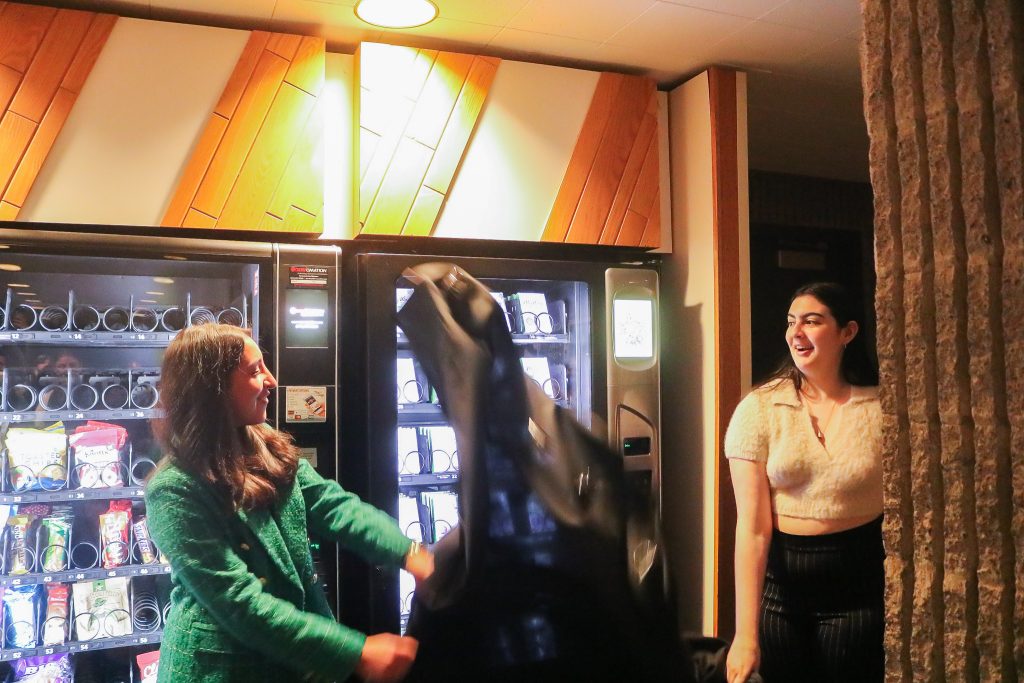Campus leaders unveiled a Plan B vending machine, which will sell $10 emergency contraception, in the basement of Glenn G. Bartle Library on Monday afternoon.
According to Luca Cassidy, the Student Association’s vice president for student success and a junior double-majoring in financial economics and sociology, emergency contraception access was discussed at a meeting organized by the Latin American Student Union following the leak of a Supreme Court draft opinion overturning Roe v. Wade. Cassidy, who was the College Democrats vice president at the time, suggested the establishment of a fund to cover costs for students. After meeting with University administration, he said, their focus shifted.
“We realized in our conversations that the main issue wasn’t price — we had $10 Plan B at Decker [Student Health Services Center],” Cassidy said. “The main issue was time. We are fortunate [that Decker is] open 9-5 on weekdays, but students needed that alternative option after hours and the weekends, because if they didn’t, they will be forced to buy overpriced Plan B that’s $30 to $60 off campus, so something I proposed that can combat this is a 24/7 vending machine.”
The ceremony began with a speech from Binghamton University President Harvey Stenger, who thanked Decker leadership and highlighted the impact of the Road Map interns, a group of students that work with administration on the Road Map plan’s six strategic priorities in a program re-founded by Nora Monasheri, the BU Council representative and a first-year graduate student studying business administration.
“The vending machine embodies an optimal solution,” Monasheri wrote. “It is private, accessible, cheap and available during moments of utmost need. While we hope students will not need to use it, in the emergency that it is needed, this vending machine shows students that they are supported.”
Cassidy and Mia Raskin, a Road Map intern and a first-year graduate student studying business administration, thanked those who contributed to making the vending machine a reality. After a short countdown, the vending machine was unveiled to the crowd.
“This is open pretty much all the time, especially during exams,” Stenger said. “It’s open 24/7, much longer hours than the Decker Health Services office, so when somebody has an emergency need, they can come here, and they can get it in a much safer way than when I was growing up.”
The machine dispenses one 1.5 milligram dose of levonorgestrel, the generic form of Plan B, sold under the brand My Way. The drug, a “backup method of preventing pregnancy,” works mainly by preventing ovulation, though it does not protect against sexually transmitted diseases. Students can scan a QR code in the top right corner of the machine to learn more about emergency contraception.
Monasheri said she offered to help Cassidy make the vending machine a reality with the help of Raskin and Daniel Chavarria, a Road Map intern and a senior majoring in business administration. When conducting research and preparing to present detailed presentations to administration, leaders from Planned Parenthood Generation Binghamton worked closely alongside Cassidy and the Road Map interns.
Sophia Panos, the organization’s president and a senior majoring in integrative neuroscience, and Yume Igarashi, the social media coordinator and a junior majoring in integrative neuroscience, contributed to the project. Panos emphasized the collaborative process involved in making the vending machine a reality.
“All of us together, mainly we met every single week, and just put together first a survey for the students, gauging interest, seeing how many students would actually be interested in this,” Panos said. “After that, we put together a presentation for administration so you know, [Stenger], also [Decker] Student Health Service just to kind of show them, ‘hey, this is how many students are interested, and this is how we plan to do the project.’”
The student survey garnered over 1,400 responses, indicating that 88 percent of respondents said they strongly agreed an emergency contraception vending machine would benefit the campus community. A majority of surveyed students were unaware that Decker Health Services sold Plan B for $10.
The working group gave several presentations to administrators and contacted other universities with an emergency contraception vending machine on their campuses for a benchmark. They then sent a proposal to several vending machine distributors to gauge interest. After receiving several bids, the group eventually partnered with VendTek. The emergency contraception is purchased separately and loaded into the machine, with revenue used for supply and maintenance. They also worked with organizations like Emergency Contraception for Every Campus and the New York Birth Control Access Project.
“Today as we unveil our beautiful Plan B machine, this project is much more than the functionality of itself,” Raskin said. “It represents the epitome of the potential to turn a dream into a reality with your time at [BU]. I believe that the greatest lesson that we learned from this project and hope to pass on to our next generation of Road Map interns and a future student body is to trust and commit to the process.”



